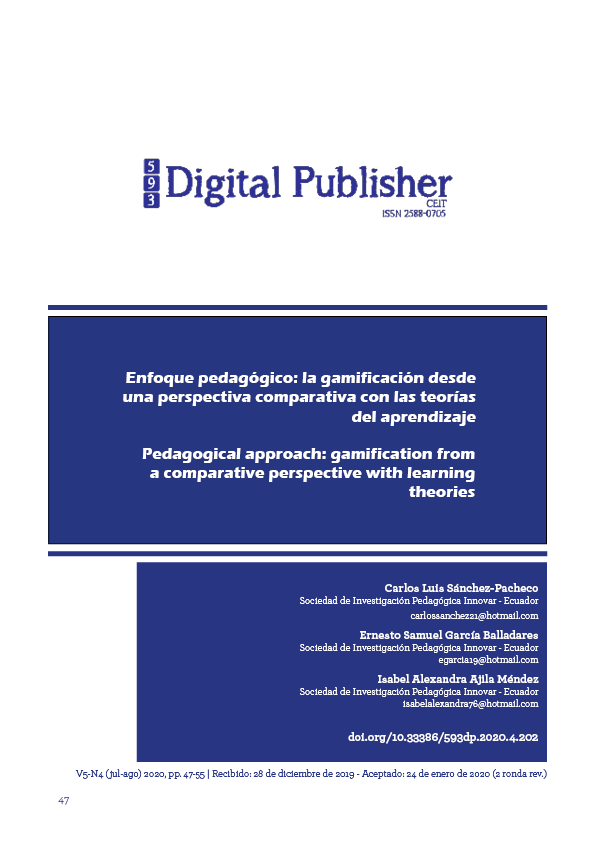Pedagogical approach: gamification from a comparative perspective with learning theories
Main Article Content
Abstract
The present article tries to study gamification as a fifth theory of learning when making a comparison from the behavioral, cognitivist, constructivist and connectivist approaches throughout each element of the learning process. As the real value of the theories can only be judged by the following effects, mainly based on the response to the contemporary problems and challenges of society, the social, cultural, economic and technological environment should not be underestimated and should be taken into account from the beginning. The goal is to constitute a new finding, such as gamification as a theory of learning that is a completely new interpretation. The first part of the article explains social and cultural trends, which could be better addressed by applying the theory of gamification in education than with the previous concepts. The second seeks to increase the gamification between learning theories, and the third makes suggestions to launch more research based on the new perspectives and frame some possible ways for future application.
Downloads
Article Details
1. Derechos de autor
Las obras que se publican en 593 Digital Publisher CEIT están sujetas a los siguientes términos:
1.1. 593 Digital Publisher CEIT, conserva los derechos patrimoniales (copyright) de las obras publicadas, favorece y permite la reutilización de las mismas bajo la licencia Licencia Creative Commons 4.0 de Reconocimiento-NoComercial-CompartirIgual 4.0, por lo cual se pueden copiar, usar, difundir, transmitir y exponer públicamente, siempre que:
1.1.a. Se cite la autoría y fuente original de su publicación (revista, editorial, URL).
1.1.b. No se usen para fines comerciales u onerosos.
1.1.c. Se mencione la existencia y especificaciones de esta licencia de uso.
References
Biro, G. (2013). Ready, study, share: An inquiry into the didactic approach of gamification with a special view to the possible application in higher education. 1st Annual International Interdisciplinary Conference, AIIC 2013 (págs. 341-345). Azores, Portugal: Na-tional University of Public Servi-ce, Hungary.
Borrás Gene, O. (junio de 2015). Fun-damentos de la gamificación. doi:10.13140/RG.2.1.3807.9848
Contreras Espinosa, R. S., & Eguia, J. L. (2017). Experiencias de gami-ficación en aulas. . Barcelona. España: Institut de la Comunica-ció, Universitat Autònoma de Barcelona.
Deterding, S. (2012). Gamification: de-signing for motivation. Interacti-ons, New York, v. 19, 14-17.
Días, C., Caro, N., & Gauna, E. (21 de abril de 2015). Cambio en las es-trategias de enseñanza-aprendizaje para la nueva Gene-ración Z o de los “nativos digita-les”. Obtenido de Virtual Educa: https://reposital.cuaed.unam.mx:8443/xmlui/bitstream/handle/123456789/4134/VE14.164.pdf?sequence=1&isAllowed=y
Díaz Cruzado, J., & Troyano Rodríguez, Y. (2013). El potencial de la ga-mificación aplicado al ámbito educativo. Obtenido de En III Jornadas de Innovación Docen-te. Innovación Educativa: res-puesta en tiempos de incerti-dumbre: https://idus.us.es/xmlui/bitstream/hand-le/11441/59067/EL%20POTENCIAL%20DE%20LA%20GAMIFICACION%20APLICADO%20AL%20AMBI-TO%20EDUCATIVO.pdf?sequence=1&isAllowed=y
Espiritusanto, O. (2017). Generación Z: móviles, redes y contenido gene-rado por el usuario. Revista de Estudios de Juventud, 114, 111-126.
Fromann, R. (2015). Gamification – épülőben a Homo Ludens tár-sadalma? (E. Jóvenes, Ed.) Re-cuperado el 04 de julio de 2019, de http://edit.elte.hu/xmlui/bitstream/hand-le/10831/38099/Fromann_disszerta-cio_tezisfuzet.pdf?sequence=2&isAllowed=y
Gutiérrez Campos, L. (2012). Conecti-vismo como teoría de aprendiza-je: conceptos, ideas, y posibles limitaciones. Revista Educación y Tecnología, N° 1, 111-122.
Horovitz, B. (04 de mayo de 2012). After Gen X, Millennials, what should next generation be? Obtenido de http://usatoday30.usatoday.com/money/advertising/story/2012-05-03/naming-the-next-generation/54737518/1.
Islas Torres, C., & Carranza Alcántar, M. (2012). Uso de las redes sociales como estrategias de aprendizaje. ¿Transformación educativa? Apertura, 6-15. Obtenido de http://www.udgvirtual.udg.mx/apertu-ra/index.php/apertura/article/view/198/213
Kapp, K. M. (2012). The gamification of learning and instruction : game-based methods and strategies for training and education. San Francisco, CA: Pfeiffer.
Koster, R. (2004). A Theory of Fun for Game Design. Paraglyph Press.
Lozano, O. (2014). Las redes Sociales como soporte a los ambientes de aprendizaje conectados. Obteni-do de Congreso Iberoamericano de Ciencia, Tecnología, Innova-ción y Educación: https://www.oei.es/historico/congreso2014/memoriactei/525.pdf
Melo-Solarte, D., & Díaz, P. A. (2018). El Aprendizaje Afectivo y la Gamifi-cación en Escenarios de Educa-ción Virtual. Información Tecno-lógica Vol. 29(3), 237-248. doi:http://dx.doi.org/10.4067/S0718-07642018000300237
Murphy, E. (1997). Constructivism: From Philosophy to Practice. Obtenido de https://files.eric.ed.gov/fulltext/ED444966.pdf
Ortiz Granja, D. (2015). El constructi-vismo como teoría y método de enseñanza. Sophia, Colección de Filosofía de la Educación, núm. 19, 93-110.
Pérez-Escoda, A., Castro-Zubizarreta, A., & Fandos-Igado, M. (2016). La competencia digital de la Gene-ración Z: claves para su intro-ducción curricular en la Educa-ción Primaria. doi:https://doi.org/10.3916/C49-2016-07
Rodríguez, F., & Santiago, R. (2015). Gamificación. Cómo motivar a tu alumnado y mejorar el clima en el aula. Barcelona (España): OCEANO S.L.U.
Sánchez-Pacheco, C. L. (2018). Cono-ciendo la Nueva Generación de Estudiantes Secundarios ecuato-rianos a través de la Redes So-ciales. RevistaIndexadaEdu.com, 48-60.
Sánchez-Pacheco, C. L. (2019). Gamifi-cación en la educación: ¿Bene-ficios reales o entretenimiento educativo? Revista Internacional Docentes 2.0 Tecnología Educa-tiva, 11-19.
Siemens, G. (12 de diciembre de 2004). Conectivismo: Una teoría de aprendizaje para la era digital. Recuperado el 08 de julio de 2019, de https://www.comenius.cl/recursos/virtual/minsal_v2/Modulo_1/Recur-sos/Lectura/conectivismo_Siemens.pdf
Sobrino Morrás, Á. (2014). Aportaciones del conectivismo como modelo pedagógico post-constructivista. Propuesta Educativa, 39-48.
Torres-Toukoumidis, A., & Romero-Rodriguez, L. (2018). Gamifica-ción en los docentes de educa-ción superior del Ecuador. En Gamificación en Iberoamérica Experiencias desde la comuni-cación y la educación (págs. 211-220). Abya-Yala.
Torres-Toukoumidis, Á., & Romero-Rodríguez, L. M. (2018). GAMI-FICACIÓN EN IBEROAMÉRICA. Experiencias desde la comuni-cación y la educación. Quito-Ecuador: Editorial Universitaria Abya-Yala.
Tünnermann Bernheim, C. (2011). El constructivismo y el aprendizaje de los estudiantes. Universida-des, núm. 48, enero-marzo, 2011, 21-32.
Vázquez-Martínez, A., & Cabero-Almenara, J. (2015). Las redes sociales aplicadas a la forma-ción. Revista Complutense De Educación, 26, 253-272. doi:https://doi.org/10.5209/rev_RCED.2015.v26.47078
Zepeda - Hernández, S., Abascal - Me-na, R., & López - Ornelas, E. (2016). INTEGRACIÓN DE GA-MIFICACIÓN Y APRENDIZAJE ACTIVO EN EL AULA. Ra Xim-hai, vol. 12, núm. 6, julio-diciembre, 2016, 315-325.
Zichermann, G., & Cunningham, C. (2011). Gamification by Design. Canada: O’Reilly Media.
Zimmerman, E., & Salen, K. (2003). Ru-les of Play: Game Design Fun-damentals. The MIT Press.

